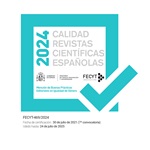Recepción del Derecho romano en la incapacidad sucesoria de los hijos ilegítimos, y la doctrina jurídico-teológica hispana de la Edad Moderna. (RI §420581)

Reception of the roman law in the successful disability of illegitimate children, and the modern age of hispanic legal-theological doctrine -
Beatriz García Fueyo
El régimen jurídico aplicado a los hijos ilegítimos es una de las regulaciones jurídicas que procedentes del Derecho romano, con su evolución hasta Justiniano, ha mantenido la vigencia, a través de los cuerpos legales medievales, hasta la Edad Moderna, y se aplicaron incluso las restricciones legales de las Novelas justinianeas, aunque la nueva perspectiva de igualdad de los hijos, sea cual sea su origen, ha derogado dicha regulación en el Derecho positivo vigente.
Introducción. I. Aspectos biográficos de Alonso Antonio de San Martín, hijo de Felipe IV. II. Recepción del Derecho romano en la biografía del hijo regio. III. Aspectos normativos de la incapacidad sucesoria mortis causa del hijo ilegítimo. IV. Doctrina teológico-jurídica hispana del siglo XVI. V. Consideraciones finales.
The legal regime applied to illegitimate children is one of the legal regulations that come from Roman law, with its evolution until Justinian, has maintained the validity, through the medieval legal bodies, until the Modern Age, and restrictions were applied even of the justinian novels, although the new perspective of equality of the children, whatever their origin, has repealed this regulation in the current positive law.
Introduction. I. Biographical aspects of Alonso Antonio de San Martín, son of Felipe IV. II. Reception of Roman law in the biography of the royal son. III. Normative aspects of the incapacity succession mortis causa of the illegitimate son. IV. Hispanic theological-legal doctrine of the sixteenth century. V. Final considerations.

 DIRECTORA
DIRECTORA